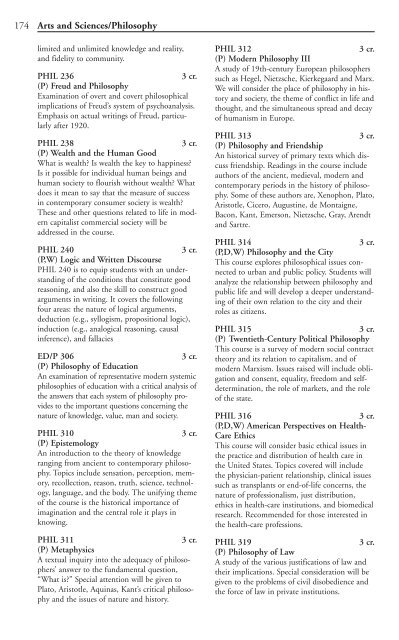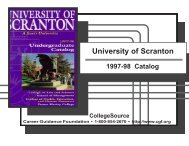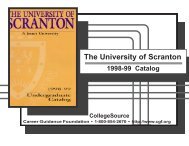2003-2004 - The University of Scranton
2003-2004 - The University of Scranton
2003-2004 - The University of Scranton
You also want an ePaper? Increase the reach of your titles
YUMPU automatically turns print PDFs into web optimized ePapers that Google loves.
174 Arts and Sciences/Philosophy<br />
limited and unlimited knowledge and reality,<br />
and fidelity to community.<br />
PHIL 236 3 cr.<br />
(P) Freud and Philosophy<br />
Examination <strong>of</strong> overt and covert philosophical<br />
implications <strong>of</strong> Freud’s system <strong>of</strong> psychoanalysis.<br />
Emphasis on actual writings <strong>of</strong> Freud, particularly<br />
after 1920.<br />
PHIL 238 3 cr.<br />
(P) Wealth and the Human Good<br />
What is wealth? Is wealth the key to happiness?<br />
Is it possible for individual human beings and<br />
human society to flourish without wealth? What<br />
does it mean to say that the measure <strong>of</strong> success<br />
in contemporary consumer society is wealth?<br />
<strong>The</strong>se and other questions related to life in modern<br />
capitalist commercial society will be<br />
addressed in the course.<br />
PHIL 240 3 cr.<br />
(P,W) Logic and Written Discourse<br />
PHIL 240 is to equip students with an understanding<br />
<strong>of</strong> the conditions that constitute good<br />
reasoning, and also the skill to construct good<br />
arguments in writing. It covers the following<br />
four areas: the nature <strong>of</strong> logical arguments,<br />
deduction (e.g., syllogism, propositional logic),<br />
induction (e.g., analogical reasoning, causal<br />
inference), and fallacies<br />
ED/P 306 3 cr.<br />
(P) Philosophy <strong>of</strong> Education<br />
An examination <strong>of</strong> representative modern systemic<br />
philosophies <strong>of</strong> education with a critical analysis <strong>of</strong><br />
the answers that each system <strong>of</strong> philosophy provides<br />
to the important questions concerning the<br />
nature <strong>of</strong> knowledge, value, man and society.<br />
PHIL 310 3 cr.<br />
(P) Epistemology<br />
An introduction to the theory <strong>of</strong> knowledge<br />
ranging from ancient to contemporary philosophy.<br />
Topics include sensation, perception, memory,<br />
recollection, reason, truth, science, technology,<br />
language, and the body. <strong>The</strong> unifying theme<br />
<strong>of</strong> the course is the historical importance <strong>of</strong><br />
imagination and the central role it plays in<br />
knowing.<br />
PHIL 311 3 cr.<br />
(P) Metaphysics<br />
A textual inquiry into the adequacy <strong>of</strong> philosophers’<br />
answer to the fundamental question,<br />
“What is?” Special attention will be given to<br />
Plato, Aristotle, Aquinas, Kant’s critical philosophy<br />
and the issues <strong>of</strong> nature and history.<br />
PHIL 312 3 cr.<br />
(P) Modern Philosophy III<br />
A study <strong>of</strong> 19th-century European philosophers<br />
such as Hegel, Nietzsche, Kierkegaard and Marx.<br />
We will consider the place <strong>of</strong> philosophy in history<br />
and society, the theme <strong>of</strong> conflict in life and<br />
thought, and the simultaneous spread and decay<br />
<strong>of</strong> humanism in Europe.<br />
PHIL 313 3 cr.<br />
(P) Philosophy and Friendship<br />
An historical survey <strong>of</strong> primary texts which discuss<br />
friendship. Readings in the course include<br />
authors <strong>of</strong> the ancient, medieval, modern and<br />
contemporary periods in the history <strong>of</strong> philosophy.<br />
Some <strong>of</strong> these authors are, Xenophon, Plato,<br />
Aristotle, Cicero, Augustine, de Montaigne,<br />
Bacon, Kant, Emerson, Nietzsche, Gray, Arendt<br />
and Sartre.<br />
PHIL 314 3 cr.<br />
(P,D,W) Philosophy and the City<br />
This course explores philosophical issues connected<br />
to urban and public policy. Students will<br />
analyze the relationship between philosophy and<br />
public life and will develop a deeper understanding<br />
<strong>of</strong> their own relation to the city and their<br />
roles as citizens.<br />
PHIL 315 3 cr.<br />
(P) Twentieth-Century Political Philosophy<br />
This course is a survey <strong>of</strong> modern social contract<br />
theory and its relation to capitalism, and <strong>of</strong><br />
modern Marxism. Issues raised will include obligation<br />
and consent, equality, freedom and selfdetermination,<br />
the role <strong>of</strong> markets, and the role<br />
<strong>of</strong> the state.<br />
PHIL 316 3 cr.<br />
(P,D,W) American Perspectives on Health-<br />
Care Ethics<br />
This course will consider basic ethical issues in<br />
the practice and distribution <strong>of</strong> health care in<br />
the United States. Topics covered will include<br />
the physician-patient relationship, clinical issues<br />
such as transplants or end-<strong>of</strong>-life concerns, the<br />
nature <strong>of</strong> pr<strong>of</strong>essionalism, just distribution,<br />
ethics in health-care institutions, and biomedical<br />
research. Recommended for those interested in<br />
the health-care pr<strong>of</strong>essions.<br />
PHIL 319 3 cr.<br />
(P) Philosophy <strong>of</strong> Law<br />
A study <strong>of</strong> the various justifications <strong>of</strong> law and<br />
their implications. Special consideration will be<br />
given to the problems <strong>of</strong> civil disobedience and<br />
the force <strong>of</strong> law in private institutions.
















